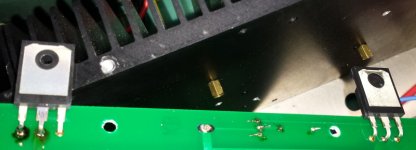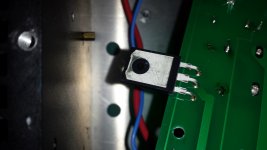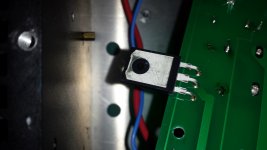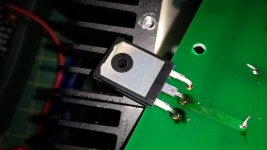Did you put a new,different p.s. board in recently?
The problem started before the new ps board. Same problem with new ps board.
The problem started before the new ps board. Same problem with new ps board.
I'm assuming you've tried different pre amps and interconnect cables? If you can catch it and have a can of Freezit try giving the jfets a shot and all the joints if possible.
Last edited:
I'm assuming you've tried different pre amps and interconnect cables?
Changing preamps is what started this. I thought it was the preamp, but now static with nothing connected.
What will FreezIt do? Does it help find cold solder joint or hot components?
I have a scope, but don't use it. Can it be directly connected to amp output or does the amp need 8 ohm load as well?
I have a scope, but don't use it. Can it be directly connected to amp output or does the amp need 8 ohm load as well?
You changed the preamp and it started to happen?Did you change the interconnecting cables as well? I would try swapping the cables for the channels,i think you said only one channel does it? If that doesn't change anything then maybe the preamp put out some kind of spike and messed up the jfet(s) or maybe one channel on the preamp is bad,try changing it back to the one before the change.Freezit may exaberate a bad jfet (quiet it or more static).The scope can be connected directly and you may see some wierd bursts.Maybe check your rca inputs and see if the solder joints look ok,maybe a bad solder joint on one was disturbed when unplugging a cable?If any look like a cold joint give it a shot of Freezit or just resolder and try.
Sorry, crossed posts - you've got a tricky one there.
Perhaps the preamp problem created this one in the amp - Suggest use a dummy load and run just a watt or so and connect CRO across the load to see if/any unwanted noise
Not sure what the fereezing of the jfets would indicate but might create a dc offset on the output = dummy load.
Perhaps the preamp problem created this one in the amp - Suggest use a dummy load and run just a watt or so and connect CRO across the load to see if/any unwanted noise
Not sure what the fereezing of the jfets would indicate but might create a dc offset on the output = dummy load.
I presume you've tried swapping the Lt & Rt inputs to make sure the problem is internal?
Yes, first thing I did. Static happens with nothing connected. Also tried shorting the input + to gnd, but no change.
You changed the preamp and it started to happen? Did you change the interconnecting cables as well? I would try swapping the cables for the channels
The cable change was made between a DAC and preamp. The changed cables were not directly connected to the amp. There's an active crossover before the amp. Three amps actually. Before making the change, I switched preamp to empty input. I doubt there was a spike to amp.
Reproduction chain:
DAC> B1> BA3-PRE to (2) B4 XOs> amps.
maybe one channel on the preamp is bad
Preamp(s) are OK. In active 3-way all other channels on that side ok.
Just his one amp in that one channel.
Will connect up the scope and see at what point the static shows up.
I'm guessing the jfets, which in unfortunate since they are so expensive.
That's life! 🙂
Last edited:
Oxidisation on a component leads can cause poor solder joints, this in turn can act like a diode and demodulate the AM rf.
Try resoldering before replacing anything, pay special attention to the gates.
Or try slugging the the gates with a caps to ground; if that cures it, remove one at a time to see when the interferance comes back.
Try resoldering before replacing anything, pay special attention to the gates.
Or try slugging the the gates with a caps to ground; if that cures it, remove one at a time to see when the interferance comes back.
Could be anything. Beat on it and poke around with a 100 pF capacitor while
listening to cheap speakers.
listening to cheap speakers.
Definately did the beat on it bit. Not much of a change happened. Thought I head a change tapping p3, but it's such a random hiss, there's no pattern.
When you say "poke around with a cap", does on end need to be grounded or just tough one cap lead to a board component lead?
When you say "poke around with a cap", does on end need to be grounded or just tough one cap lead to a board component lead?
Definately did the beat on it bit. Not much of a change happened. Thought I head a change tapping p3, but it's such a random hiss, there's no pattern.
When you say "poke around with a cap", does on end need to be grounded or just tough one cap lead to a board component lead?
One end to ground,the other end to touch component leads.Will ground the interference.
Ok, pretty interesting. Used a 180pF cap. Touched around the signal path. One resistor reacted to the cap touching the leads. One side went from hiss to to a hum. The other side of the resistor started to pickup a transmission and light voices. The hiss subsided a little when running the cap lead across the board around the resistor.
Took out magnifying lenses and the resistor looks like it has a weak solder joint, but the joint doesn't move. I shifted the resistor on its leads a little.
I let my dog out and when I went back to the amp, the hissing stopped (with no cap connected). I will start with that resistor. It's a mosfet gate resistor.
thanks,
Vince
Took out magnifying lenses and the resistor looks like it has a weak solder joint, but the joint doesn't move. I shifted the resistor on its leads a little.
I let my dog out and when I went back to the amp, the hissing stopped (with no cap connected). I will start with that resistor. It's a mosfet gate resistor.
thanks,
Vince
Last edited:
Sounds promising Vince.Great idea about the capacitor,have to remember that one.FYI,a PACE soldering course I took said to use isopropyl alcohol and lint free tissues to scrub the component leads of contamination before soldering.
Last edited:
Great idea about the capacitor,have to remember that one
I know what you mean. It's Nelson's idea. 🙂
Yeah, I have to start cleaning the leads. Guilty.
Resoldering the resistor didn't help, so took off pcb board. Found discolored mosfet back and source lead. Damage from overheating or possible bad solder job on source lead. What do you think?
Attachments
One more pic...
Having gone through IPC PBC assembly training/certification, the PCB shows evidence of far too much heat applied.
- Home
- Amplifiers
- Pass Labs
- First Watt F7 review



